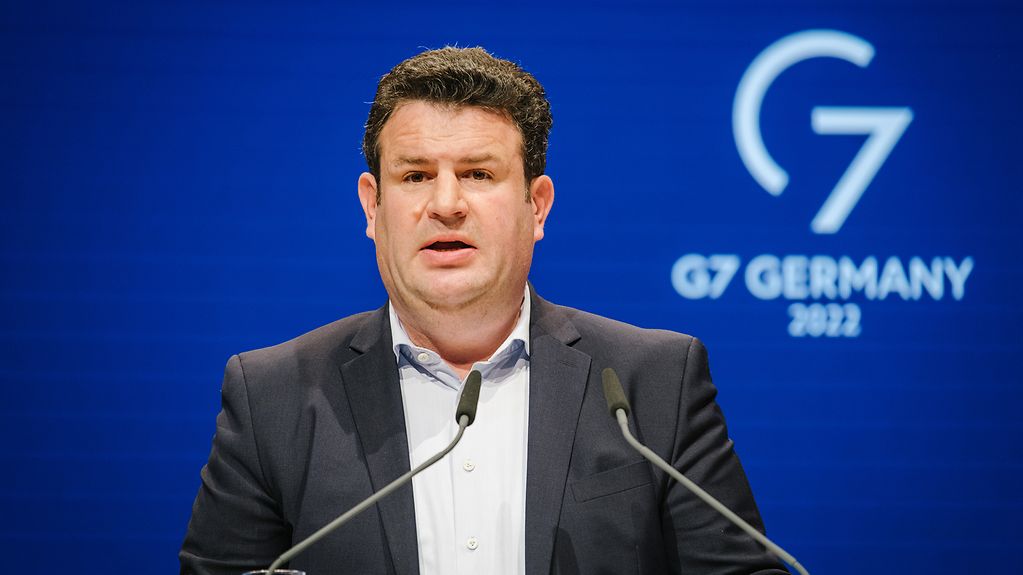G7 Labour Ministers
At their meeting, the G7 Labour Ministers agreed on measures to facilitate a just transition to a social-ecological market economy. For the first time, the German G7 Presidency also added the impact of climate change on occupational safety to the international agenda.

After the meeting with his G7 counterparts, Federal Minister for Labour and Social Affairs Hubertus Heil stressed the important link between social protection and climate action.
Photo: picture alliance/dpa/Ole Spata
Digitalisation, climate change, globalisation: the G7 countries have agreed to ensure that changes in the world of work are handled fairly so as to secure sound job opportunities in a social-ecological market economy. Federal Minister for Labour and Social Affairs Hubertus Heil exchanged views with his G7 counterparts in Wolfsburg.
No fear of change
“The common goal in the G7 countries is to ensure that today’s workers are qualified to do the jobs of the future, too,” Heil explained. For this reason, the Labour Ministers decided to advocate for sound training opportunities, along with lifelong learning and an entitlement to professional development.
The G7 Presidency has been able to put climate protection, occupational safety and international relations on the agenda together as related issues. Occupational safety in view of changing climatic conditions is a pressing concern. Heil called for climate action and social protection to go hand in hand. “Safe and healthy working conditions are fundamental rights.” He added that the G7 would support the ILO in establishing this as a core labour standard. “This is a concrete improvement for workers worldwide.”
The G7 Labour Ministers further agreed to jointly advocate binding standards with regard to human rights in global supply chains. This will especially benefit those companies that are already acting responsibly. After all, fair competition only thrives when everyone has to abide by the same binding rules.
Democracies are closing ranks
The Russian attack on Ukraine and its consequences was also a major issue of discussion at the meeting of the Labour Ministers. “We strongly condemn this attack,” said the Federal Minister for Labour and Social Affairs, adding that Putin was blatantly violating the principles of international law.
The war is having an impact on economic and social policy worldwide, and the ministers discussed how to counter these consequences. Heil said it was important for labour markets to remain intact, for the social impact of price increases to be cushioned and for the people who have fled Ukraine to be treated fairly.
“The G7 is a community of values made up of democracies that seek to cooperate with each other in times of current crises and wars, as well as on fundamental issues,” said the Federal Minister of Labour and Social Affairs after the meeting.
The motto “Just Transition – Make it Work“ is the underlying theme of the 2022 German G7 Presidency in the field of labour and social affairs. In order to achieve this goal, Federal Minister of Labour and Social Affairs Hubertus Heil has opted for close cooperation with his counterparts from France, Italy, Japan, Canada, the UK and the USA. The decisions made at the meeting will be taken into account at the conference of the G7 Heads of State and Government from 26 to 28 June in Schloss Elmau.
Opportunities in a changing world of work
On 11 May, Federal Chancellor Scholz received the representatives of Labour7 at the Chancellery to discuss the challenges and opportunities of a rapidly changing world of work. The guests handed him their recommendations and proposals for a socially just transformation.
A week earlier, representatives of the G7states, international organisations, trade unions, employers and civil society met in Berlin to discuss globally binding standards for sustainable supply chains.